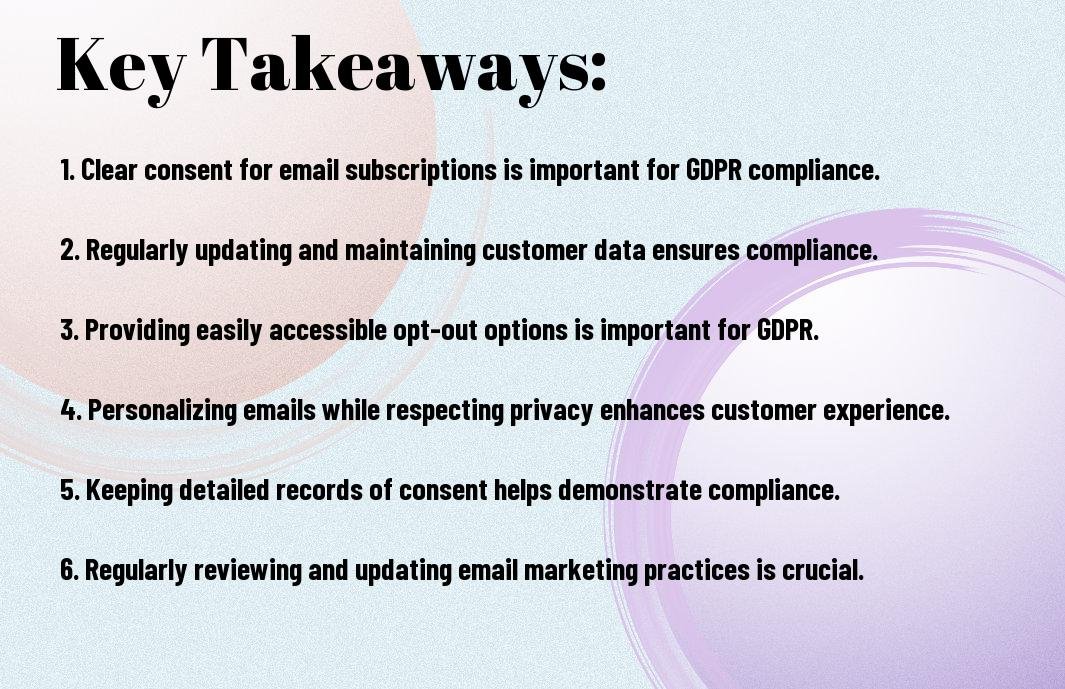It’s imperative for businesses to ensure their email marketing practices are in full compliance with the General Data Protection Regulation (GDPR) to protect the sensitive data of their customers and avoid costly penalties. In light of this, let’s look into some successful examples of how businesses are adeptly navigating the complexities of GDPR to maintain trust and transparency with their email communication.

Key Takeaways:
- Clear consent: Businesses excelling at GDPR-compliant email practices obtain clear consent from subscribers before sending any marketing emails.
- Transparency: They are transparent about how they collect, store, and use personal data in their emails.
- Data security: These businesses prioritize data security by implementing measures to safeguard customer information in their email communications.
- Opt-out options: They provide easy and accessible options for subscribers to opt out of receiving emails, as required by GDPR regulations.
- Regular audits: Successful businesses conduct regular audits to ensure their email practices comply with GDPR regulations and make necessary adjustments if needed.


Principles of GDPR-Compliant Emailing
Lawfulness, Fairness, and Transparency
The cornerstone of GDPR-compliant email practices lies in ensuring lawfulness, fairness, and transparency in the processing of personal data. This means that businesses must have a valid legal basis for sending emails, provide clear and concise information about data processing to recipients, and obtain explicit consent for marketing communications.
Limitation of Purpose and Data Minimization
Emailing practices should adhere to the principle of limitation of purpose and data minimization under GDPR. This requires businesses to clearly define the purpose for collecting and processing email addresses, ensuring that data collected is adequate, relevant, and limited to what is necessary for the intended purpose.
It is crucial for businesses to regularly review their email lists to remove inactive or irrelevant contacts, thus reducing the risk of non-compliance with GDPR regulations. By establishing clear guidelines on the collection and use of email data, businesses can ensure they are compliant with GDPR while building trust with their audience.

Strategies for Success in GDPR Compliant Emailing
Many businesses are striving to excel in GDPR-compliant email practices to ensure they adhere to the regulations set forth by the European Union. To navigate this complex landscape successfully, it’s crucial to stay informed and implement best practices. For small businesses looking to enhance their email marketing strategies within GDPR guidelines, resources like GDPR Compliance for Small Businesses: Email Marketing can provide valuable insights.
Consent Acquisition and Management
Consent is the cornerstone of GDPR compliance when it comes to email marketing. It’s necessary to obtain explicit consent from individuals before sending them marketing emails, and this consent must be documented and easily accessible. Implementing robust consent management processes can help businesses build trust with their audience and avoid potential legal repercussions.
Implementing the Right to be Forgotten
The right to be forgotten is a fundamental aspect of GDPR that allows individuals to request the deletion of their personal data. Businesses must have mechanisms in place to honor these requests promptly. This includes not only removing data from email lists but also ensuring it’s deleted from all systems and databases. Failure to comply with right to be forgotten requests can result in hefty fines and reputational damage for businesses.
Understanding the intricacies of GDPR regulations and implementing comprehensive strategies is vital for businesses aiming to excel in GDPR-compliant email practices. By prioritizing consent acquisition and management, as well as implementing robust processes for the right to be forgotten, businesses can build credibility, trust, and long-lasting relationships with their audience while staying compliant with GDPR guidelines.
Innovations in Data Protection and Privacy
Encryption and Anonymization Techniques
Unlike traditional email practices, businesses excelling at GDPR-compliant email practices are increasingly incorporating encryption and anonymization techniques to protect sensitive data. Anonymization is a critical process that involves removing or encrypting personally identifiable information to ensure the privacy and security of email communications.
Privacy by Design in Email Platforms
Privacy by Design in Email Platforms is a crucial innovation that emphasizes incorporating privacy and data protection features directly into the design and architecture of email systems. This approach ensures that user data is automatically safeguarded and privacy preferences are respected without requiring manual intervention or additional settings by the user.
Platforms that prioritize Privacy by Design also implement measures such as end-to-end encryption, secure data storage, and access controls to prevent unauthorized access or data breaches.
Industry Leaders in GDPR-Compliant Practices
Adopting Best Practices in Email Personalization
Industry leaders like Amazon have set a high standard in GDPR-compliant email practices by adopting best practices in email personalization. By leveraging customer data in a secure and transparent manner, they tailor email content to individual preferences and purchase history, enhancing customer engagement and loyalty.
Exemplary Transparency and User Control Measures
Transparency is key for businesses excelling at GDPR-compliant email practices. Companies like Google provide exemplary transparency and user control measures by clearly outlining how personal data is collected, stored, and used in their email communications. Users have full visibility into their data and can easily manage their preferences for a more personalized experience.
Control
Empowering users with control over their data is imperative for GDPR compliance. Industry leaders go beyond regulatory requirements by implementing robust user control measures, such as explicit opt-in processes, easy opt-out options, and clear instructions on managing data usage and preferences.
Conclusion
Taking this into account, the examples of businesses excelling at GDPR-compliant email practices highlight the importance of respecting consumer data privacy in today’s digital landscape. By implementing transparent communication, obtaining explicit consent from customers, and providing easy opt-out options, these companies have set a standard for email marketing compliance. Businesses can learn from their strategies and adopt similar practices to build trust with their audience while ensuring compliance with data protection regulations.
FAQ
Q: What are some key practices that businesses can adopt to excel at GDPR-compliant email practices?
A: Businesses can excel at GDPR-compliant email practices by obtaining proper consent before sending emails, providing easy options for users to unsubscribe, regularly updating their email lists, ensuring data security, and conducting regular audits to ensure compliance.
Q: How can businesses ensure they have consent before sending marketing emails under GDPR regulations?
A: To ensure consent under GDPR, businesses should use clear and specific language when obtaining consent, provide opt-in checkboxes that are not pre-checked, keep records of consent, and allow users to easily withdraw consent.
Q: What are the benefits for businesses that excel at GDPR-compliant email practices?
A: Businesses that excel at GDPR-compliant email practices build trust with their customers, avoid costly fines for non-compliance, enhance their reputation, improve deliverability rates, and create more targeted and effective email campaigns.
Q: How important is data security in GDPR-compliant email practices?
A: Data security is crucial in GDPR-compliant email practices as it ensures the protection of personal data from unauthorized access, disclosure, alteration, and destruction. Businesses must implement robust security measures to safeguard customer information.
Q: What steps can businesses take to continuously improve their GDPR-compliant email practices?
A: Businesses can continuously improve their GDPR-compliant email practices by staying updated on GDPR regulations, providing regular training to employees handling customer data, responding promptly to data breaches, seeking feedback from customers, and implementing privacy by design principles.
Recent Posts
Affiliate Offer Goldmine: How I Find Profitable Affiliate Offers
Affiliate marketing can be overwhelming if you rely on guesswork or follow generic advice. I've discovered that most beginners waste time promoting overcrowded, untested, or unprofitable offers. In...
As an affiliate marketer, you know how crucial it is to create engaging and effective blog posts that drive traffic and generate sales. But coming up with fresh and profitable ideas can be a...

